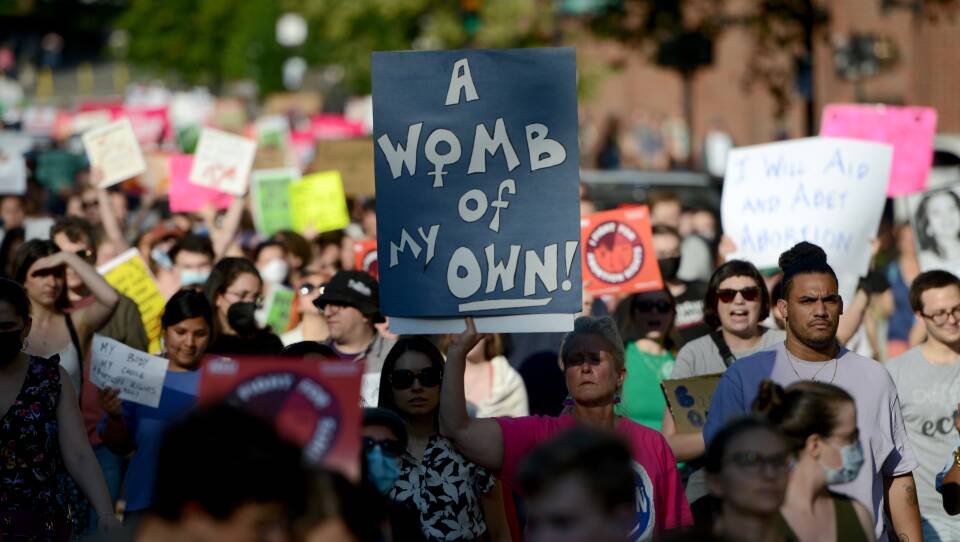Even before the Supreme Court of the United States overturned the constitutional right to abortion in June, abortion providers in Massachusetts had been seeing more out-of-state patients.
That's one of the main takeaways from new data on abortion in Massachusetts, which the state released in August. The numbers detail how many abortions were performed here in 2021 and break down information about the women who ended their pregnancies.
GBH News spoke with abortion advocates and experts about what the data can say — and what it can’t — about the state of abortion in Massachusetts.
More people from out of state are getting abortions in Mass.
As individual states ban or heavily restrict abortions, experts have expected women in those states to cross borders and get abortions where it’s more easily accessible. Massachusetts providers said that was already happening before Roe v. Wade was reversed, and an uptick in 2021 adds another piece of evidence to the mix.
“2021 would have been the start of beginning to see some people trickle in from Texas,” said Margaret Batten, who sits on the board at the Jane Fund and Eastern Massachusetts Abortion Fund, which help patients pay for abortions .

Following the September 2021 implementation of the so-called “heartbeat bill” in Texas , which prohibits abortions after roughly six weeks of pregnancy, providers saw more patients traveling from the state to get an abortion in Massachusetts. “That’s usually somebody who is from Massachusetts originally, or maybe their best friend lives in Massachusetts,” said Reproductive Equity Now’s executive director Rebecca Hart Holder. In other words, most of these out-of-state patients already had ties to Massachusetts.
But since June, when the Supreme Court overturned Roe v. Wade, both Batten and Hart Holder have heard anecdotal reports of people trying to come to Massachusetts even if they don’t have any connections here. Clinics have been swarmed in states where neighboring states have restrictive laws, pushing out wait times for an appointment up to four to eight weeks. Those delays are motivating people to look “farther afield,” Batten said.
A major question that remains to be answered is just how much state-level abortion bans will bring people to Massachusetts. But state bans are still wending their way through the legislative process, and Hart Holder says it will be a couple years before the commonwealth has the data to know how significant that impact will be.
“I think that would be reading my crystal ball a little bit too much,” she said. “I wish I could.”
Abortion pills are playing a bigger and bigger role
Medication abortions are more common than ever, and local experts expect that number to keep increasing.
The two-prescription regimen can be used in the first 9 to 11 weeks of pregnancy — different from “the morning-after pill,” or Plan B, which has to be taken in the first few days after unprotected sex. After first becoming available in 2000, medications now account for roughly half of all abortions in the state.

But “it’s still lower in [Massachusetts] than the national average of 54%,” pointed out Ushma Upadhyay, a reproductive health researcher at the University of California, San Francisco. (Nationwide, 54% of abortions in 2020 were medication abortions, as estimated by reproductive health research organization the Guttmacher Institute.)
Researchers who spoke with GBH News said studies generally do not delve into why women opt for a medical or surgical abortion, and there’s no clear single reason why Massachusetts would lag behind the national average of those choosing medication. But they pointed to various factors that could be contributing: Massachusetts’ many independent clinics and hospitals could be providing surgical abortions in more medically complex cases; both surgical and medication abortion are readily available through many avenues, like telehealth and a plethora of clinics, potentially giving women the option to choose which they’d prefer rather than taking whatever’s closest by; and the fact that state health insurance covers abortions, which might mean that women aren’t opting for the medication option just because it’s cheaper.
Experts believe medication abortions will become even more common under the rising popularity of abortion by telehealth and new state laws. Massachusetts’ new reproductive rights law, signed in July, requires public colleges to create plans for providing medication abortions at their campus health centers — or connect students with providers — by late 2023 .
The rise in medication abortion “means that people can access lower-cost, less-invasive care,” Hart Holder said. “And that can be a game changer for people where there isn't an abortion provider easily accessible — places like western Massachusetts and on the Cape and Islands. So the fact that we continue to see that increase is a really good thing for access in Massachusetts.”
Nine in 10 abortions in Mass. occur during the first trimester, and still few post-24 weeks
Abortions overwhelmingly take place in the first 12 weeks of pregnancy in Massachusetts. That’s in line with the national trend: Data provided to the Centers for Disease Control and Prevention shows that, since 2006, at least 90% of abortions have taken place in the first trimester.
But for people who want or need abortions after the 24-week mark, accessing them in Massachusetts has gotten easier in the last two years. The ROE Act in 2020 made post-24 week abortions legal in the cases of lethal fetal anomalies. Post-24 week abortions are rare enough that the data doesn’t show a conclusive trend: just 37 in 2021, even after the expansion, the highest since 2014.
“One of the main reasons that people seek abortion later in pregnancy is because something has changed in their life. And so there's nothing we can do from a public health or policy perspective to prevent those changes from happening — sometimes people get sick later in pregnancy and they just need an abortion,” said Elizabeth Janiak, the director of social science research at the Planned Parenthood’s ASPIRE Center. “And so I certainly think if we are seeing a ‘zero‘ number there, what we're seeing is that we don't have good access to care in Massachusetts.”
The new reproductive-rights law signed by Gov. Charlie Baker in July expanded post-24 week exceptions again to include “grave” fetal anomalies.
“We have improved the language based on feedback from physicians,” Hart Holder added. “And I do think that it will realize our goal that no person should be forced to travel outside of Massachusetts for abortion care.”
Planned Parenthood is a cornerstone of Massachusetts’ abortion landscape
Just over half of all abortions in 2021 took place through a Planned Parenthood. Its Boston clinic alone provided over 4,500 abortions — more than a quarter of all abortions in the state. It’s in line with prior years’ abortions, too.
President and CEO Jennifer Childs-Roshak told GBH News that the Planned Parenthood League of Massachusetts took steps during the pandemic to “ensure all our services, including abortion, were accessible, launching a successful telehealth program that allowed us to see patients virtually and send abortion pills by mail.”
She added that PPLM was “proud to be the leading provider of sexual and reproductive health care in Massachusetts.”

Other advocates told GBH News independent clinics and doctors still have a key role to play. Hart Holder says independent clinics and hospitals are often the ones providing care for farther-along, more medically complex abortions.
“If you look at northeast Massachusetts, there are 1,500 abortions and Planned Parenthood isn't there. And southeast, there are 1,900 and Planned Parenthood isn't there,” Batten said. “Planned Parenthood is doing a great job at covering in three big health centers, but there are still areas — and that’s not even to mention the Cape and the Islands, right? — so there are still areas of Massachusetts that need abortion care providers.”
Popular beliefs about the women who get abortions are more myth than fact
Women who get abortions are likely to already have children, and they’re very unlikely to be teenagers.
“We see here in Massachusetts — as well as nationally — that the largest group of folks getting abortion care is folks in their 20s, and that pregnancy and abortion among teenagers is much more rare than it is among young adults,” Janiak said. “[That’s true] particularly here in Massachusetts, where we have a very low teen pregnancy rate and the lowest teen birth rate in the country.”

In 2021, 53% of women who got abortions were in their 20s, 35% were in their 30s, and 7% were less than 20 years old.
Before the 2020 ROE Act, 16- and 17-year-olds needed the consent of a parent or judge to get an abortion. Many strongly opposed the effort to lower the age, including Gov. Baker, who vetoed the bill — but was overruled by the State House.
Some believed it would lead to an increase in teenagers getting abortions, but 2021 data — the first year the ROE Act was in effect — shows that that trend has not panned out. Of all Massachusetts abortions, the share occupied by teenagers has declined every year over the last decade, from 12% in 2011 to under 7% in 2021.
“It hasn't happened and it's not going to happen,” Janiak said. “And I think the numbers show that.”
Most women who get abortions have also already had children, nearly 6 in 10 in 2021, which has held steady for several years.
“They're managing the size of their family and their resources and the timing of the family,” Batten said. “I think there's the sense that these are uneducated, you know, mindless young people. And the data seems to show to the contrary. ... And that, I think, also goes to dispel some common myths. You know, contraceptive failure happens to everybody.”









